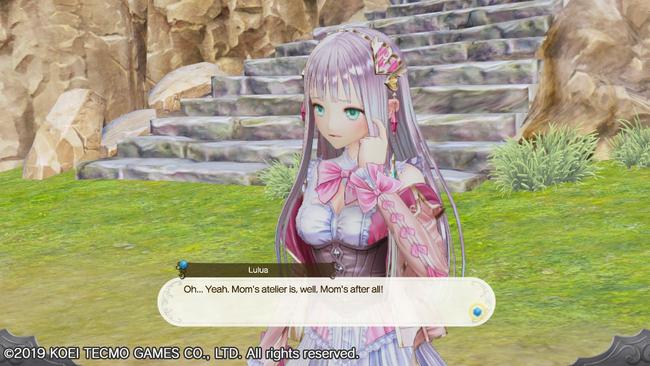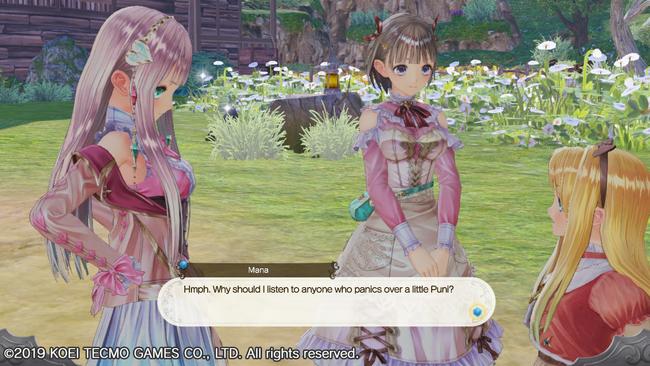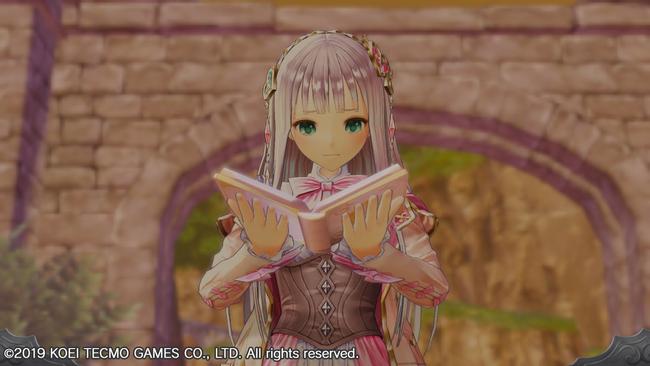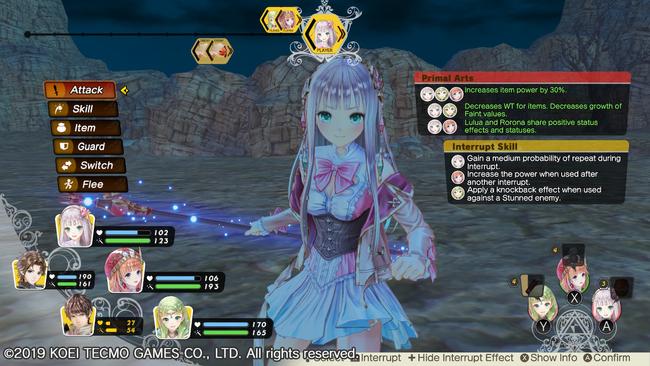
Atelier Lulua: The Scion of Arland Review
This year has been jam-packed with Atelier goodness. Between Koei Tecmo’s re-release of the Arland trilogy on modern systems, and the localization of fanservice title Nelke and the Legendary Alchemists, it seems crazy that we’re already getting another, brand-new Atelier game (not to mention yet another game around the corner). But here we are with Atelier Lulua: The Scion of Arland, the sequel to the original three Arland games. How does this new Atelier title stand with one of the more popular Atelier trilogies?

Atelier Lulua takes place sometime after the original Arland trilogy of games (that is Atelier Rorona, Atelier Totori, and Atelier Meruru), though the exact amount of time is never specified. We’re introduced to Elmerulia Frixell, better known as Lulua, who wants to become an alchemist that surpasses the greatest alchemist of Arland, and her mother, Rorona herself. Progress for Lulua seems to be going slowly at first, but one day she finds the ‘Alchemyriddle’, a mysterious artifact only she can read. The Alchameyriddle takes her on adventures all across the Arland Republic, where she’ll learn more about the continent and the ancient civilization that existed long ago.
While the other Arland titles mainly focused on their respective main characters and their personal goals, Atelier Lulua’s plot takes a wider lens, revealing more about the land itself. That isn’t to say this isn’t Lulua’s tale--it’s still very much about her growth as a person and alchemist as she uncovers the secrets of the past. But aspects of the world that were largely ignored for the original trilogy are touched on here.
Perhaps more importantly to some, though, we get to see some of our favorite characters from the original trilogy and see how they’re doing. It’s fun to see the alchemists now older and (possibly) wiser, as well as what they’ve all decided to do after their respective storylines completed. It’s prudent to note that while these cameos and nods are really nice to longtime fans, you don’t absolutely need to play the previous three games to enjoy Atelier Lulua. It adds to the experience a bit, but the game won’t leave you completely in the dark about who you’re talking to or where you are without three games’ worth of knowledge under your belt.

This is good, because as much as I enjoy the Arland trilogy, later Atelier titles have certain elements to them that make them much easier to manage. Atelier Lulua takes a lot of these elements from the newer games and refines them, as well, making sure not to stick strictly to the formula from the other three games.
First and foremost, time management is not an issue with this game. Time limits have not been around since Atelier Shallie, and Atelier Lulua did not bring them back for a callback to the other Arland titles. At first, I thought this would make the game boring as I attributed my boredom with the Mysterious trilogy of games to the absence of the need for time management. But it turns out, an Atelier title can be interesting without a timer breathing down your neck.
A lot of this is thanks to the Alchemyriddle. The Alchemyriddle is essentially your guide throughout the game, giving you the main tasks you need to complete for each chapter, as well as providing sub-tasks you can complete or ignore as you choose. Doing the subtasks gets you nice recipes and unlocks new areas to explore, but it never forces you to do anything other than the main plot tasks in order to complete the game.
Of course, this isn’t all spelled out for you… it’s the Alchemyriddle, after all! Each task has you trying to solve a riddle, and essentially fill in the blanks with hints to complete the page. Once the page is complete, you get the reward! Most of the hints are easy to suss out with the hint and picture provided, it’s just up to you on whether or not you want to go out of your way and complete the extra tasks.

Generally, I’m not a person that likes to complete games or exhaust all their content. However, Atelier Lulua is the first game in a while where I want to complete as much as possible before moving on. Filling out the pages of the Alchemyriddle is oddly addicting, and encourages me to explore all of the areas and fight all sorts of monsters, things I might have avoided in previous Atelier titles for one reason or another. On top of that, it’s great that everything, from the main and side tasks to other events, all alert you to their presence. Especially in the original Arland trilogy, events could be easy to miss. Coupled with the time restriction, this can lead to stressful playthroughs.
Aside from the Alchemyriddle, most of Atelier Lulua is the standard Atelier fare, just tweaked and upgraded. Battles are turn-based affairs with three battlers and two party members that can switch in when the going gets tough. But, alchemists can interrupt the turn flow by using equipped items, and back up characters can activate special attacks under the right circumstances. It adds some strategy to battle, even if the power of the interrupt mechanic encourages you to use all three of your alchemist party members when you have them.
Combat is ultimately a small part of Atelier Lulua, though, and the main draw of any Atelier game is alchemy! There are plenty of items to make in Atelier Lulua, and recipes old and new to discover and take advantage of. New to the series is the Awakening mechanic, however. When it’s unlocked, using certain items in recipes will allow you to awaken hidden traits in the resulting creation. It’s a neat mechanic, but honestly, Awakening isn’t needed to complete anything in the main game. It’s a sort of mechanic to help those who want to try and min-max for the best items available.

Wholesale, which is the ability to sell someone one of your items and have them replicate it for buying back later, is present in Atelier Lulua and as great as ever. On top of that, you will also eventually unlock the ability to Restock your items. Most of the time, once you use up your consumable items, they’re gone forever, making it hard to justify using your best items at times. Restock allows you to use your items up, then return to the Atelier and pay a nominal fee to have the items replaced. Now instead of rarely using my bombs or my super powerful Elixir, I’ll use items constantly in battle, because I know I can have them replaced.
I had hit a couple of snags while playing Atelier Lulua, though. A couple of the early chapters make you go out and gather and fight aimlessly until the Alchemyriddle thinks it’s ready to move the plot along, which was a little disappointing. Also, while you can technically complete every page of a chapter’s subtasks in that chapter itself, some of them can be extremely difficult to do without just letting it sit and coming back later. Finally, a few things aren’t explained too well, like the ability to open a guide for each area to see what you need to hit 100% for that area. But honestly, these are more nitpicks than anything else.
Atelier Lulua is one of the more new player friendly titles of the series yet, tweaking mechanics to be more intuitive than previous entries. Also, as a long-time fan of the series, it was great to return to Arland and learn more about the world and characters. Atelier Lulua is one of the better Atelier titles in recent years, and it’s worth picking up for any fan of the series.